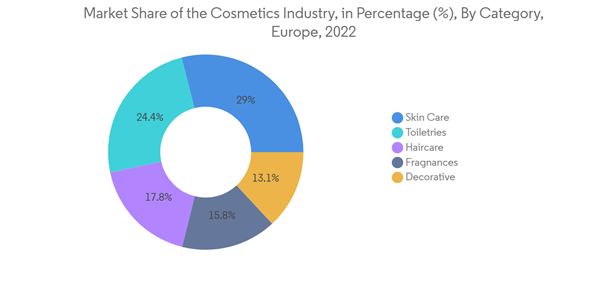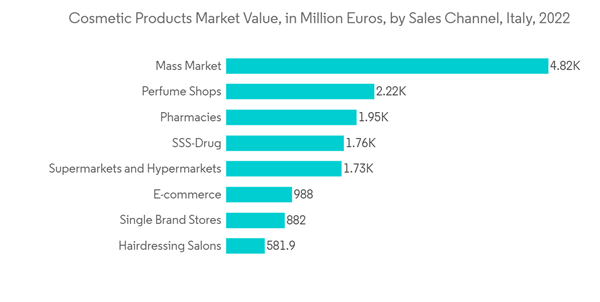Rising cosmetic and beauty product consumption and rising sophisticated plastic packaging technology innovation are expected to drive the market. The growing sustainability concern is the need for biobased plastic in tube packaging for personal care.
Key Highlights
- Tubes are the ideal forms of packaging for semi-solid fillings. The plastic materials and combinations of plastic materials offer an unattainable range of advantages, such as the highest hygiene standards, superior barrier properties, product protection, limitless design options, consumer benefits, and future-proof environmental compatibility.
- With its high standard of quality, tremendous versatility, and an impressive array of compelling advantages, the tube has found its way into many industrial and end-use markets, such as cosmetics and more. The European Tube Manufacturers Association member companies have contributed to the market victory and the high-quality standards of the tube. They account for about 75% of European flexible tube production and are ahead of the pack and world leaders in quality standards.
- The potential market for organic and natural cosmetic products is currently in the European region, driven by the shifting consumer preferences toward the beauty industry. According to a poll done by Global Web Index on more than 2,300 web users from the United Kingdom who routinely purchase organic and natural cosmetics, 80% of them do so out of concern for their health and the environment. The European cosmetics market is anticipated to grow and hold onto its top spot in the next years due to its big consumer base.
- Multilayer plastic packaging (MMPP) is a widely used packaging structure for personal care, pharmaceuticals, foods, and other FMCG products. By combining the functions of different materials, these packaging structures can improve properties, including resource use and barrier performance, which can lead to subsequent advantages, such as extended Europe. However, they also challenge existing recycling systems, thus challenging circular economy principles.
- The embedded heterogeneity of MMPP has become an obstacle for the recycling industry. Waste characterization is essential for mechanical recycling steps with quality end-products. Conventional waste management systems aren't designed to detect, sort, and recycle multilayer MMPP. This makes MMPP a challenging material to recycle. Over the forecast period, this circular economy challenge eventually fuels the demand for alternative forms of tube packaging in different parts of Europe, such as paper and metal, restraining the growth of the market studied.
- The trend of customized beauty, which was prevalent even before the outbreak of COVID-19, is expected to gain more significance. Market players are likely to adopt online consultation and artificial intelligence to cater to the new mode of purchasing. Generation Z's views and consumption patterns are noteworthy as they were shaped during the era of social media. The younger generation prefers to showcase the products online, which has become even more vital since the COVID-19 pandemic.
Europe Personal Care Plastic Tube Packaging Market Trends
Skin Care to Witness the Growth
- Plastic packaging of skin care items has a preservation benefit over other packaging materials. When it comes to storing and safeguarding skincare, the packaging is crucial. It can extend the lifespan of beauty products in some situations. Furthermore, it guarantees that the unique qualities of the materials are preserved.
- The skin care market leads the way in the cosmetics business in Europe. Cosmetics Europe's August 2023 report shows that skincare accounted for the highest market value, accounting for approximately EUR 26 billion (~USD 27.51 Billion) in 2022, accounting for 29% of the total cosmetics market in Europe. Consumer spending on cosmetics spending comprises traditional and innovative premium skin products, including firming and anti-aging lotions and creams, nighttime formulations to repair skin, and skin brighteners. The market segment in which the United Kingdom, Finland, and Denmark experienced whopping growth in the last few years is led by anti-aging products.
- To address this ever-growing demand in the European market, several brands are expanding their foothold across the region. For instance, in July 2022, Proven Skincare implemented its first international expansion after its July 2021 launch in Canada into the European Union and the United Kingdom. The company decided to enter Europe owing to the substantial growth the brand has experienced recently and the desire for individualized skincare products.
- At present, reusable, recyclable, and biodegradable packaging is growing in Europe, and packaging is increasingly created with the life cycle in mind. To protect biodiversity and lower carbon footprints, the region's beauty, skincare, and personal care industries would participate in an initiative launched by the European industry. Further, in July 2023, the Finnish brand Lumene selected Cosmogen's patented Tense tube for its new range of serum in Concealer hybrid eye-care products. The tube comprises recycled PE, and the applicator is detachable for recycling and sorting at the end of its life cycle.
- The European market for natural ingredients is the largest in the world, and the demand for natural ingredients in the European skincare market is increasing. The import of natural ingredients for cosmetics from developing countries is also on the rise. Like paraben-free cosmetics, vegan and cruelty-free skincare has seen rapid growth in recent years across Europe. In addition to the ingredients, manufacturers are increasingly interested in eco-friendly packaging. Sustainability, waste prevention, and recyclability are just factors influencing both the manufacturers' and consumers' decisions in selecting the product. However, manufacturers also attach great importance to the appearance of their packaging. A product's packaging fulfills all functions and conveys the brand's message to the region and the world.
Italy to Witness the Growth
- The Italian cosmetics market is one of the largest in Europe in terms of turnover and consumption. Italy ranks fourth in total consumption in 2021, according to Cosmetica Italia. The consumption of cosmetics in Italy reached over EUR 10.94 billion (USD 11.55 billion) in 2022 compared to EUR 10.64 billion (USD 11.27 billion) in 2021. The market is expected to witness a similar growth trend in the forecast timeframe, thus fueling the growth of tubes in personal care.
- Notably, the most valuable products in the domestic market are body care, face care, hair care, and perfumes. According to Cosmetica Italia, regarding consumption, anti-aging, Anti-wrinkle, Moisturizing, and Nutrient cream were worth nearly EUR 1.5 billion (USD 1.59 billion), accounting for the largest share in the face care category. Additionally, the high degree of flexibility makes tubes a superior choice for cosmetics and skincare products.
- Tube is one of the most popular cosmetic, personal care, and beauty packaging formats. Players operating in the region, such as MÄDER, offer innovative coatings for flexible plastic tubes. The company's products can adapt to match the most stringent requirements on both visual and functional levels. Such customization in products will positively impact the market in the long run. Moreover, players focus on horizontal and vertical integration to capitalize on the market growth. For instance, in April 2022, Perfektüp Ambalaj, one of Turkey's leading packaging companies, took an essential step toward becoming a global brand with the acquisition of Italian company Tubettificio Favia, which has been operating as a manufacturer of aluminum tubes for 88 years.
- Furthermore, exports and domestic consumption have contributed to the recovery of the Italian cosmetics industry. In 2022, the Italian cosmetics industry returned to and exceeded the production levels before the COVID-19 pandemic. According to the data provided by Cosmetica Italia, the total turnover of the country's beauty companies accounted for EUR 13.3 billion (USD 14.09 billion) in 2022, a Y-o-Y increase of 12.1%. In 2023, the total turnover is expected to increase by 7.7% compared to the year before. As per Cosmetica Italia, exports of Italian cosmetics represent 40% of the total turnover of the Italian industry in 2022. They should continue to drive the sector's growth in 2023, with an expected increase of 10%.
- The increasing spending on dental care and dental care products also influences the demand for the market. According to IQVIA, toothpaste held the second-highest market share (15%) in oral care products sold in pharmacies in Italy in 2022. Cosmetica Italia states the sales value of toothpaste in Italy was EUR 476 million (USD 504.20 million) in 2022. All such factors are expected to have a positive impact on the market growth.
Europe Personal Care Plastic Tube Packaging Industry Overview
The European personal care plastic tube packaging comprises several global and regional players vying for attention in a contested market space. The industry is highly fragmented, comprising market incumbents such as ALPLA GROUP, Berry Global, Global Tube SpA, ALLTUB SAS, EPL Limited, and several regional packaging firms.- August 2023 - Berry Global announced the merger of its M&H and PET Power businesses to form a new pan-European unit - Berry Agile Solutions. The new unit will provide short lead times and low minimum order quantities, including multiproduct orders, to customers of all sizes.
- July 2023 - ALPLA is expanding its circular economy. The company plans to invest approximately EUR 8 million (USD 8.72384 million) in the third extrusion line on the site, increasing the annual production capacity from 30,000 to 54,000 tons of food-grade PET recycling (rPET) at the Radomsko recycling plant in Poland.
Additional Benefits:
- The market estimate (ME) sheet in Excel format
- 3 months of analyst support
This product will be delivered within 2 business days.










